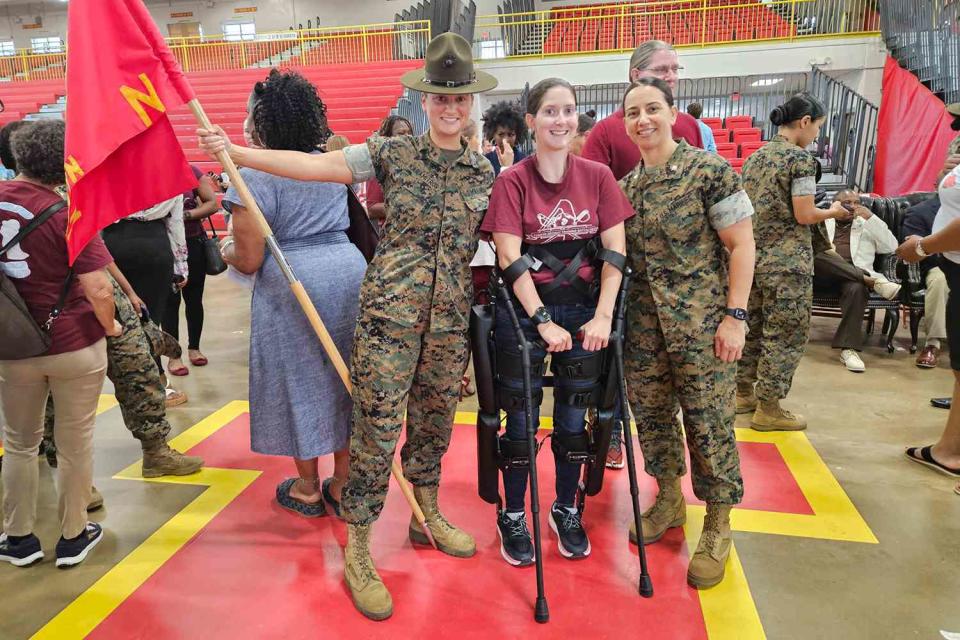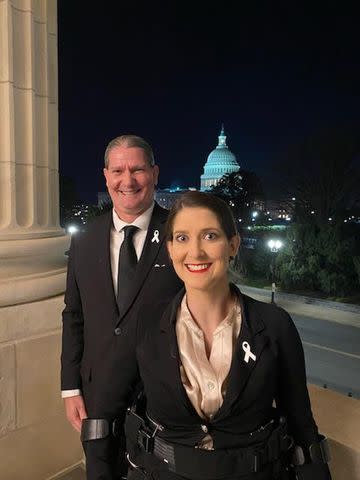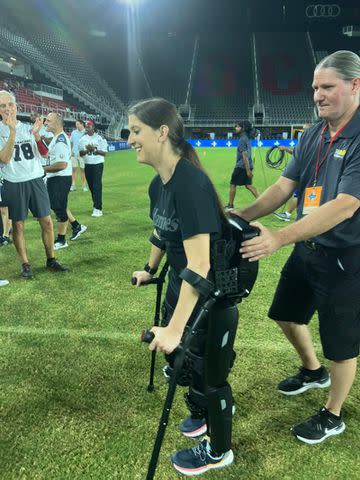Quadriplegic Veteran's Robotic Exoskeleton Gave Her 'a Beautiful Life' — Now She Works to Get Them to More Vets
Marine Corps Veteran Brittany Elliott spent years fighting for the device that helps her walk — now she hopes to do the same for other veterans

Courtesy of the Elliott Family
A car accident left Marine Corps Veteran Brittany Elliott quadriplegic eight years ago, but with the help of technology and her own determination, she's walking again, thanks to a robotic exoskeleton.
Now, she's telling her story to lawmakers in Washington, D.C., working alongside other veterans to help create the STAND Act, a bill announced last week which will facilitate access to these exoskeletons for other disabled veterans who need them.
“My mission is to spread awareness about this device,” says Elliott, 33, who lives in Red Boiling Springs, Tenn. with her father. “It’s not science fiction – it’s real life. Getting back on your feet and moving brings so much more to the table than just walking.”
Elliott was taking a gun-carrying class one Saturday in February 2013, where a Marine saw her shoot and asked what she did for a living and whether she had considered joining the military. He sent a recruiter to the Wal-Mart in Lenoir City, Tenn., where she worked as a pharmaceutical technician, and she enlisted in the Marine Corps that Friday.
Six months later, Elliott was medically discharged after breaking her right femur in a training accident. She was told that she would need two years for her leg to heal, after which she planned to re-enlist.
“I was counting down the days,” she says. "All I wanted to do was go back into the service. I really found what I felt was my place." She was training for her physical performance and combat readiness testing, she says, "to prove I was fit to return to duty.”

Courtesy of the Elliott Family
Brittany Elliott in Washington, D.C.About a month before she was eligible to take the fitness test, on July 3, 2015, she was driving a car containing her then-girlfriend and some friends when "a drunk driver ran a red light and hit us head on,” she says.
“I knew in that instant that my ability to go back into any branch of service was forever gone,” she says. “I had no idea what I was going to do. ”
Related: Celebrity Veterans: Stars Who Served in the Military

Courtesy of the Elliott Family
Brittany Elliott in the hospitalIn addition to whiplash and a concussion, Elliott sustained a spinal cord injury that left her a quadriplegic.
“I lost my ability to do everything,” she says.
She watched the July 4 fireworks from her hospital bed. A week later, she turned 25 in the ICU.
She read online about ReWalk robotics exoskeleton that allows quadriplegics to walk. She saw the VA was doing a study.
“I pestered and annoyed people until I got into the study,” she says. She traveled to the VA Hospital in St Louis, Mo. in April 2018, where she was trained on the device and took it home for 12 weeks. She loved it.
“It allows me to walk,” she says. She can even climb stairs.

Kristi Koehler of ReWalk Robotics for Image 2 at the National Wheelchair Games.
Brittany Elliott at the National Wheelchair GamesWhen she's in her wheelchair, Elliott says, people tend to ignore her, or to ask her father directly, “What’s wrong with her?”
“It’s like they think it’s contagious,” she says. “My chair is my legs, but it doesn’t define me. It’s how I walk. But when I’m in an exoskeleton, people will talk to me. They’re not afraid of it – despite the fact that it sounds like a robot.”
The difference in how people treated her led to improvements in her mental health, and in her physical health as well; her bone density and her bladder control improved and she lost weight.
But then she had to give it back.
“It was very cruel,” says her father, Morgan Elliott, a former truck driver who is now her full-time care giver.
Elliott spent years fighting to get her own personal exoskeleton. She finally did in April 2022.
“No veteran should ever have to fight the battle I fought to get this technology,” she says. “Would you want to fight for four years to get something that made such a difference in your life?”

Courtesy of the Elliott Family
Brittany Elliott in her robotic exoskeletonShe takes the exoskeleton to public places, from Disney to Disabled American Veteran’s meetings to the Congressional Football Game. Elliott likes to go places where there will be a lot of other disabled veterans who have lost the ability to walk, in order to show them the technology and offer hope.
“Some people don’t even know it’s possible,” she says. “They’ve just resigned themselves to a chair. But it doesn’t have to be that way.”
Related: 5 Easy Ways to Support Veterans on Veterans Day and Beyond
Her father – who is always by her side -- has seen a notable difference in his daughter when she’s in her ReWalk.
“It’s life-changing. It truly is,” her dad says. “When she is in her device and we’re out, she never wants to stop. She just wants to go. She loves to be up, she loves to be walking … She’s happier when she’s in her device and walking in her device. Her whole aura changes.”
When he first saw it, it made him think of Robocop, he says. People come up to her and tell her she looks like a real-life transformer.
Despite her injuries, Elliott continues to live an active life. She and her father recently went parasailing together in Hawaii and swam with sea turtles together in Aruba.
“I don’t usually spend a lot of time in the house,” she says. “I’m usually helping my fellow vets.”
She has learned to drive; she does adaptive skiing and coaches snow skiing; she snowmobiles and skydives.

Courtesy of the Elliott Family
Brittany Elliott snowmobiling“I live a beautiful life,” she says. “The wreck may have altered my life, but it didn’t end it. It taught me what things really matter. I knew that I could give up and die, or I could make life a stunning adventure.”
And she chose to do the latter.
“It’s just getting started,” she says. “It’s getting better every day.”
For more People news, make sure to sign up for our newsletter!
Read the original article on People.


